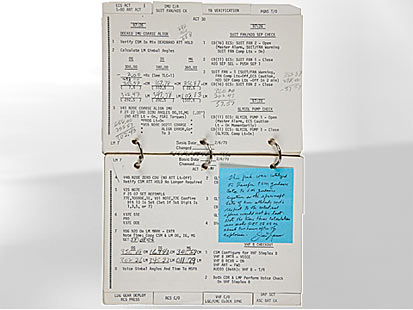Apollo 13 Astronaut’s Notes Up for Auction

Astronaut James Lovell (SSPL/Getty Images)
A famous set of notes from the failed Apollo 13 mission is now up for auction in Texas, with bids expected to reach the six figures for the checklist alone.
The 1970 space flight, one of the best-known in NASA’s history, can be summed up in five words: ”Houston, we’ve had a problem.”
That quote, often misreported as “Houston, we have a problem,” signaled the beginning of a long ordeal for the three astronauts, whose spacecraft was slated to land on the moon.
On the third day of the mission, an oxygen tank exploded. The command module – which housed the astronauts’ computer guidance system – became uninhabitable. While orbiting more than 200,000 miles from Earth, the astronauts were forced to use the lunar module as their “lifeboat,” a dramatic series of events captured in the film “Apollo 13.”
“They found out they had minutes to get from commander module to the lunar module or they were going to die,” said Howard Weinberger, a senior space consultant at Heritage Auctions in Dallas who has been collecting space artifacts for nearly two decades.

Heritage Auctions
“What they needed to do was transfer data from the guidance computer of the commander module to the computer in the lunar module,” said Weinberger.
Astronaut James Lovell did some quick calculations two hours after the explosion, then asked Houston to check his math. Mission control confirmed his calculations were correct, and he entered them into the lunar module guidance computer.
Lovell’s notes, scrawled in pencil on portions of the 70-page checklist, will now go to the highest bidder in an auction that includes more than 200 other space artifacts.
“It looked like these guys were going to die, but they kept their heads and made it home,” said a Heritage Auctions spokesman. “It’s a great American story, a great American moment.”
The live auction starts Nov. 30, but the items are already available for bidding online.
The checklist, which went up for auction about two weeks ago for $12,500, already has four bidders and is currently going for $35,000 online.
“This particular item … is really at the top of the list in terms of important artifacts that a collector or museum or institution could own,” Weinberger said.
He expects the price to go as high as $111,000, if not higher.
Weinberger, who travels around the country visiting astronauts, “the heroes of my youth,” he said, cultivates relationships that have led to multiple space auctions since he began working with the Heritage Auctions in 2007.
“The supply of quality material that exists from these fellows is not very plentiful – it’ certainly kind of winding down,” he said.
Lovell donated his checklist, and it has never been owned by anybody else.
“He’s over 80 years old, his kids have received whatever it is they wanted, he’s donated a great deal of things to the museum in Chicago. Now, after awhile, I guess you want to pass it on and let the new custodian enter,” Weinberger said of Lovell’s decision to at last part with the checklist.
Of the 214 items up for auction, Weinberger said about 130 are directly from the personal collections of several Apollo astronauts.
The checklist, he said, “is certainly the highlight of the sale” but there are at least a dozen more items he described as “very noteworthy.”
Collectors will find a rotational hand controller from Apollo 9 and the identification plate from the first lunar module ever taken up in space. Also for sale: an American flag from Apollo 11.
But the piece de resistance remains that Apollo 13 checklist.
“It’s really an incredible opportunity for collectors both new and seasoned,” said Weinberger. “This is certainly the highlight of the sale.”